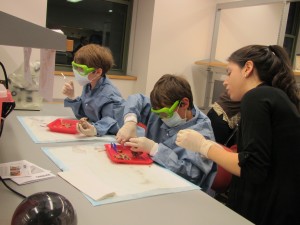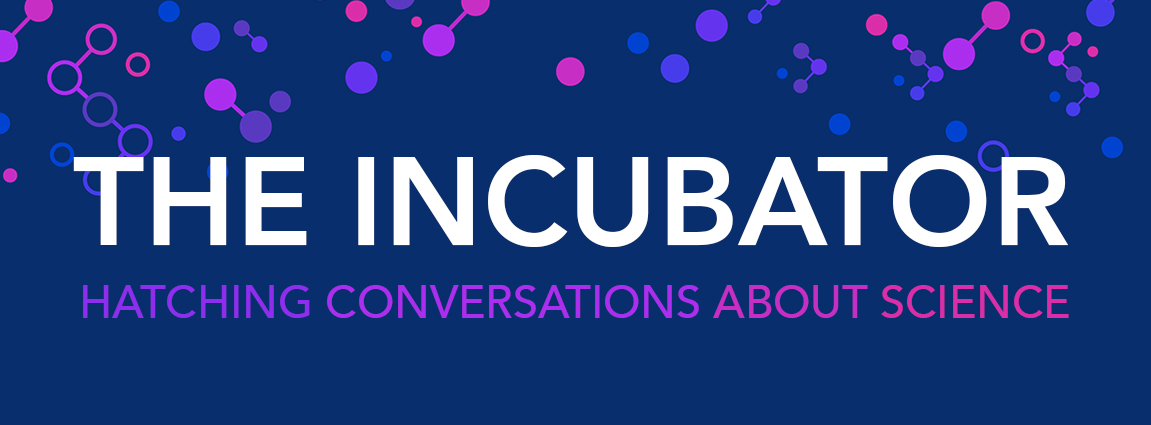My Graduate Career: How one student is using science outreach for professional development
The following series is based off The Rockefeller University Science Outreach Program’s presentation at the annual AAAS meeting, presented in San Jose, CA by Jeanne Garbarino, Elizabeth Waters, and Ali Cohen. The goals for this presentation and blog post series are to introduce science outreach, how to get started in science outreach, and how to leverage science outreach for professional development.

Written by Ali Cohen, WCMC Graduate Student and Sackler Fellow
I discovered the flavor of science outreach as an undergraduate, when I taught elementary and middle school girls from underserved communities simple science lessons. Finding this type of experience was not obvious to me when I got to graduate school, and by the end of my first year, I really missed having the opportunity to spread my enthusiasm for science and debunk any preconceived notions of science being scary or inaccessible.
To help fulfill this unmet need in my life, I went about trying to find ways to bring more of these opportunities to my graduate school community. In doing so, I’ve learned a few things about integrating science outreach into an academic setting, and discovered career development benefits of participating in outreach — beyond the “feel good” aspect. Here’s a summary of what I’ve learned so far on my outreach journey:
Finding help
There’s no need to reinvent the wheel or start a brand new outreach movement from the ground up — chances are, there’s someone near you who’s doing science outreach and is doing it well. My graduate school (Weill Cornell Medical College, WCMC) sits across the street from both Memorial Sloan Kettering Cancer Center (MSKCC) and The Rockefeller University. Given the concentration of people doing science, I wondered if there could also be people doing science outreach.
In my search, I had heard about Rockefeller’s science outreach program. So I decided to get in touch with the program director, Dr. Jeanne Garbarino. Jeanne was very receptive about working together, and both she and the lead scientist for Rockefeller’s program, Dr. Beth Waters, have been invaluable resources in putting together science outreach programming, and in creating an outreach community across campuses.
I knew I couldn’t expand outreach at WCMC and MSKCC alone, and in talking to my friends about my outreach ideas and efforts, it became clear I wouldn’t have to. Sara DiNapoli, a pharmacology student, and Mike LeVine, a biophysics student — both at WCMC — also shared my excitement for teaching science, and were excited about making these opportunities more available. Once I’d established these connections and had a game plan on how we would proceed, I approached the dean of WCMC, Dr. Gary Koretzky, about getting started. This then led to working with Dr. Marcus Lambert, the Director of Diversity, Recruitment, and Student Services at WCMC. Both of these interactions resulted in the creation of a budget for science outreach efforts.
Building an infrastructure
Before securing our own small budget and a faculty sponsor, we had to demonstrate proof of concept. So we started by co-hosting a LAB Experience in the RockEdu lab, in collaboration with Jeanne and Beth. For this event, myself and a few graduate student colleagues designed a curriculum to introduce science to high school girls with little exposure to science. The event was successful (see adorable “thank you” video by one of the students) and we had more volunteers than we needed.
Afterwards, Sara, Mike, and myself, told other graduate student friends about what we were doing, with the hopes that they might get involved. We also made sure that the WCMC the administration knew how much the graduate students (and the high school girls they taught) enjoyed the day, and showed them letters of thanks we received. This opened up the conversation for setting up a mechanism to provide other graduate students with the opportunity to participate in official outreach activities.
We set a plan to add new programming this past year, which included piloting a mentorship program with the New York Hall of Science (also a big success!), working with the Students Modeling A Research Topic (SMART) program, and co-sponsoring more LAB Experience events with the RockEdu team. To make this happen, and to continue to bring the neighboring institutions together, we formed a “Tri-Institutional Volunteer Network” made up of mostly students and postdocs interested in volunteering for science outreach programming happening within the Tri-I. We’ve quickly grown to 135 graduate student, post-doc, and physician assistant student members from WCMC and MSKCC alone!
Through this I realized that science outreach is a team sport — the more people willing to help plan, develop content, and carry out events, the more reaching out we can do!
Practical skill building
Through helping to grow science outreach opportunities in our community, and having to explain to administrators why I know outreach is important, I realized that we can gain much more from participating in science outreach than just warm and fuzzy feelings. It is clear that science outreach builds teaching and communication skills — a valuable skill set regardless of which career path you choose.
For each event, we create or modify science content to cater to a specific non-scientist audience, whether that is parents, teachers, college students, teens, or young kids. We learn to communicate science, making it accessible and fun! By planning and coordinating these activities, we learn organizational and time management skills, and what it takes to put together a successful event. To top it off, everyone involved generally comes away feeling good about what they have just done.
We also learn leadership skills, not just by leading our audience through science content or lesson plans, but also in taking on leadership roles as we volunteers work together to make these events happen. Finally, we are constantly networking — this includes forming new relationships with fellow volunteers from our own or a neighboring institutions, and getting to know institutions and organizations outside our own. Arguably, many, if not all, the skills outlined above are important for any career one may choose to pursue, and we get to build these skills while having fun at the same time!
Pursuing grant funding
Another extremely beneficial reason for participating in science outreach is funding. It is possible to leverage your science outreach experiences to make you a more competitive applicant as you apply to secure funding for your own research. In 2014, I won a National Science Foundation Graduate Research Fellowship Award (NSF GRFP), and I know that my previous and present experience with science outreach stood out to reviewers.
The NSF GRFP evaluates applications on two criteria: “Intellectual Merit” and “Broader Impacts.” The NSF defines broader impacts as:
…the potential of the applicant for future broader impacts as indicated by personal experiences, professional experiences, educational experiences and future plans.
One of the reviewers commented on the broader impacts of my application:
[…] she has done quite a bit of work already to disseminate her science, and to contaminate other females and under represented minorities with her passion and enthusiasm for science.
The NSF clearly wants to see that those they fund are helping to spread the good word of STEM fields and are giving back to the community while doing so.
The NIH, with the F-31 predoctoral fellowship as an example, also looks for plans for personal development and outreach updates. On a recent progress report submitted by a friend and fellow graduate student, she was asked to “Include any outreach activities that have been undertaken to reach members of communities who are not usually aware of these research activities, for the purpose of enhancing public understanding and increasing interest in learning and careers in science, technology, and the humanities.”
This isn’t just pervasive at the predoctoral funding level. I’ve seen that PI’s also must report outreach engagement on various grant progress reports and demonstrate their efforts to disseminate their science to the community. Participating in outreach is now an important part of helping to secure and maintain funding for academic endeavors.
I hope this brief synopsis of my ever evolving outreach journey will inspire you to get involved– or at least to consider getting involved– with science outreach for any or all of the benefits described above. The only warning I have is that once you’ve caught the outreach bug, you will almost certainly be hooked! Happy outreaching!
Read More:
- Leveraging Science Outreach for Professional Marketability
- So You Want To Do Science Outreach: Getting Started
- Doing Science Outreach: The Basics
- Finding Your Authentic Voice: Transitioning from research to outreach
Coming Up:
- Introducing Neuroscience With Jelly Beans: A low energy and inexpensive lesson anyone can do

1 thought on “My Graduate Career: How one student is using science outreach for professional development”